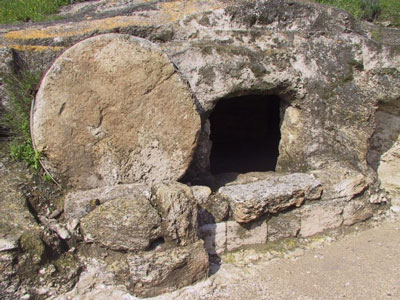If Christ is not raised

There have always been people who deny the resurrection. The first to deny the resurrection were the Jewish leaders who rejected Jesus as Messiah, who bribed the guards to say that the body had been stolen by the disciples. In Corinth, some in the church, influenced by Platonic ideas about the afterlife, denied the resurrection, instead preferring an ethereal, disembodied existence.
Today, skeptics raise questions about the accuracy of the historical accounts of the Gospels. Some point out the rather basic fact that dead bodies, once dead, tend to stay that way. Some suggest that maybe there is a natural explanation, such as the ‘swoon theory’, or that the disciples hallucinated the resurrection appearances.
However, the Apostle Paul is clear that the Resurrection is at the very foundation of our faith. “If Christ has not been raised, your faith is futile and you are still in your sins. … If in Christ we have hope in this life only, we are of all people most to be pitied” (1 Corinthians 15:17, 19). In view of its importance, every Christian should be prepared to explain and defend the doctrine of the resurrection of the dead.
The trustworthy eyewitness accounts of the resurrection
The very first Christians received the Gospel by word of mouth from eyewitnesses of the resurrection. Today, we only have access to these accounts through Scripture. Can we be confident that these accounts are trustworthy? We certainly can.
First, we know that the Gospels were written by who they’re attributed to. Matthew and John were disciples present at the Resurrection. Mark was recording Peter’s account, and Luke was a historian with ties to the apostles. All of these people were more than capable of writing a reliable account with eyewitness authority.
Second, we know when they were written. Mark probably wrote first in the 50s, perhaps as early as the 40s. Matthew and Luke followed in the 50s-60s. John according to tradition wrote his Gospel close to the end of his life in the 90s. For more, see Gospel dates and reliability.
Finally, we know that the accounts were transmitted reliably. The New Testament is the best-attested collection of documents from the ancient world, and we can say with certainty that they haven’t been changed by copyists over time. For more, see How did we get our Bible?.
The importance of the resurrection
Jesus’ resurrection is important, first of all, because it authenticates everything He said about Himself. Jesus claimed to be God, to be able to save people from their sins, and to teach us how to be reconciled with God. Part of what He claimed about Himself was that He would be killed in Jerusalem and rise on the third day. If Jesus had remained dead, it would have meant that He lied.
Jesus’ resurrection also tells us what we can look forward to, because Jesus experienced the same resurrection that we look forward to. This is because Jesus is truly man, and it was as a man that He died, and as a man that He was raised. He retains His human nature as the resurrected Lord. So we can say that our resurrection will be physical, because Jesus’ resurrection was physical, for example.
Adam and the resurrection
The reason why everyone who trusts in Christ will experience a resurrection like His has to do with how salvation works. And to explain that, Paul goes back to Adam. He says, “But in fact Christ has been raised from the dead, the firstfruits of those who have fallen asleep. For as by a man came death, by a man has come also the resurrection of the dead. For as in Adam all die, so also in Christ shall all be made alive” (1 Corinthians 15:20–22).
Paul sees humanity as being under Adam as its federal head. We die because Adam brought sin and thus death to not only himself, but all who came after him. A similar analogy is how when a government declares war, all the citizens of that government are at war, whether or not a particular individual agrees with the government’s decision.
In Christ’s death and resurrection, He has become the ‘last Adam’. Those who trust in Christ are transferred from Adam’s headship to Christ’s, and just as we inherited sin and death from Adam, we inherit the resurrection by virtue of our relationship to Christ.
It is important that all believers in Christ be resurrected, because that is how Christ’s defeat of death will finally be manifested. Paul says, “For he must reign until he has put all his enemies under his feet. The last enemy to be destroyed is death” (1 Corinthians 15:25–26).
He is risen!
Christianity is unique in that our central belief revolves around an event that happened in history. This means that it is accessible to historical investigation in ways that other religious events are not. And when we do look at the historical evidence, we find there is more than enough evidence to trust the inspired accounts in Scripture.





Readers’ comments
Comments are automatically closed 14 days after publication.